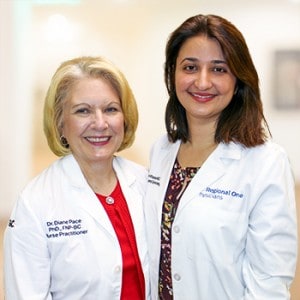While no two women will experience menopause exactly the same way, there are some basic facts everyone should know about this stage of life. Diane Pace, a certified menopause practitioner at Regional One Health, helps by outlining what you need to know and how you can take charge of your health.
Her best advice is to find a provider with expertise in caring for menopausal women and to work with them to address symptoms and your increasing risk for conditions like breast cancer, heart disease and osteoporosis.
Just like no two women are the same, no two women experience menopause the same way.
Some start in their 40s; others are well into their 50s or even 60s. Some struggle with symptoms like hot flashes and vaginal dryness while their more fortunate friends barely miss a beat.
No matter what, menopause is a time to take charge of your health, says Diane Todd Pace, a certified menopause practitioner at Regional One Health.
She said menopause can bring not only difficult symptoms, but increased risk for more serious conditions like osteoporosis, Alzheimer’s disease and breast cancer.
But it can also be a fulfilling, active time of life – and that starts with gaining the knowledge to make the best decisions for your health, Pace said.
She addressed some of the main questions she hears from patients:
When will I start menopause?
The average age is 51 – but that’s just a statistic.
One fairly good predictor is when your mother started menopause. Other factors play a role too:
- Ethnicity: African-American and Hispanic women are more likely to start menopause early.
- Lifestyle: Smoking is linked to early menopause, most likely because toxins in tobacco reduce estrogen.
- Other conditions: Radiation therapy and chemotherapy, pelvic surgery and autoimmune disease can all spark the start of menopause.
How will I know I’ve started menopause?
After you have gone 12 months without a menstrual cycle, you are in menopause.
Pace suggests keeping a diary or using an app to track your cycle. She said you need to re-start the countdown every time you have a cycle, even if it’s the first one in 11 months.
You will likely experience some warning signs before you begin menopause.
The first sign is usually changes in your cycle. You may start skipping periods. Some women have very heavy periods, or two or three a month. This can lead to medical problems like anemia, fatigue and dizziness, so you should see your doctor.
One thing Pace does not recommend is saliva testing for women in perimenopause to find out if they’ve entered menopause: “It’s a waste of money,” she said. “However, if women have symptoms, we can still offer treatment at this time.”
What symptoms can I expect?
The most common complaint is host flashes, or vasomotor symptoms. Up to 85 percent of women experience them. Pace said a hot flash happens when the core body temperature rises. The heart rate goes up and the skin flushes. You may start to sweat, followed by chills.
Other symptoms may include vaginal dryness, insomnia, painful sex and declining libido, weight gain and depression and anxiety.

Do you want to predict when you’ll start menopause? Ask your mom! Research shows that mothers and daughters often start menopause around the same age.
Again, Pace said there is no one-size-fits-all experience. You may experience all of those issues, a few of them, or, in some lucky cases, none at all. The severity also varies, as does the length of time that a woman is symptomatic.
Studies show ethnicity also plays a role in menopause symptoms. Chinese and Japanese women experience the fewest symptoms. Vaginal symptoms are most reported by Hispanic women, while depression and hot flashes are the biggest hurdle for African-American women.
Is there anything I can do about it?
This is the one question where Pace says the answer is the same for all women: Yes – and you should!
The first step is finding a provider who understands menopause care.
Pace and Pallavi Khanna, MD lead Regional One Health’s menopause care practice. Both are Certified Menopause Practitioners through the North American Menopause Society, meaning they have earned specialized expertise in helping women with the symptoms of menopause.
Pace and Khanna can guide patients through treatment options ranging from hormone therapy to lifestyle changes to medications that treat their symptoms.
Like many of the issues associated with menopause, no two women will have the same care plan, and something that works for one patient may not work for another.
